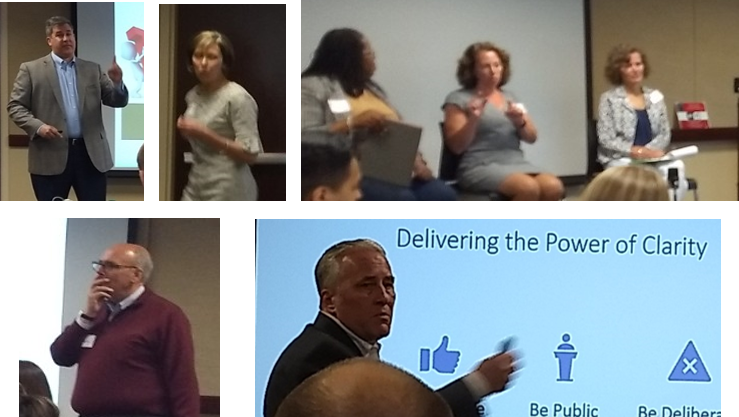MBS alumni and students attended the first-ever Rutgers MBS Leadership Bootcamp on June 14, 2019. Abbe Rosenthal, Assistant Director and Executive Coach at the Professional Science Master's (PSM) program envisioned and hosted the successful event that provided the participants with a range of leadership development tools. Abbe welcomed students, and Kathleen Cashman, an instructor and also an Executive Coach at the PSM program, kicked off the bootcamp by asking the participants ‘What will you do when you cross the threshold?’. The morning session began with leadership lessons and exercises by some of the best leadership coaches. Midday brought opportunities to network and the afternoon session explored best practices, key leadership traits, and individual executive coaching.
Ken Warman, former COO Prudential Real Estate, talked about leading through powerful connections and building trust. He explained that a successful leader has a brain with two sides: technical and emotional. The technical brain contains the knowledge required to achieve confidence in our work and the emotional brain helps build social connections and become adaptive. These skills are essential in team building. Ken in his closing remarks recommended the book ‘What it takes to be #1’, by Vince Lombardi.
Jeanmarie Cooney, former CFO Wyndham Hotels, talked about developing a leadership brand and how to use it. She asked the participants to believe in themselves and stay true to who you are. According to Jeanmarie, the secret traits of an authentic leader are: self-awareness (do the SWOT analysis on yourself), relational transparency (be objective and genuine), balance/fair-minded (be consistent, limit impulsive behavior, empower others), and internal moral perspective (integrity, courage and selflessness). In her concluding remarks she encouraged participants to remember that a tree is only as strong as its roots!
Dr. Juanita Daly, Jessica Taylor and Annette van der Feltz, discussed different aspects of inclusive leadership such as leading multicultural teams and valuing differences, as part of a panel discussion. There is a great need in today’s global workplace for clear communication and expectations. Dr. Daly explained how diversity can be categorized based on several factors including cognitive, political, race, gender, religion, ethnicity, and physical appearance. Jessica shared how diversity can be found across skills, cultures, teams and perspectives, that needs to be seen as useful dimensions of a team, and not obstacles to accomplishing a common goal. Annette highlighted the five behavioral areas that make a global team more effective: group vs. individual, egalitarian vs. high power, time orientation (mono vs. fluid), failure (mitigation vs. live/learn through) and communication (reading between the lines vs. spelling things out). After sharing their views, the panelists engaged the participants in discussions regarding creating opportunities to talk about diversity and communicating views/opinions effectively on diversity.
Steve Mendelsohn, former executive at Thomson Reuters, shared his views on collaborative leadership by developing people, aligning teams, and connecting people with their strengths to achieve goals. He facilitated a discussion on traits of a great boss and a bad boss. Steve also explained how leaders balance their obligations to their stakeholders. The participants experienced collaborative team building by building a tower out of spaghetti pieces, string, scotch tape and marshmallows. Although the tower didn’t touch the ceiling, the participants learned an important lesson -- no one member is as smart as the whole team!
During lunch, the participants networked with coaches and fellow participants. Each table and corner buzzed with exchanges ranging from cultural diversity to personal hobbies.
The afternoon session began with a presentation by Dr. Alex Skuban , Senior Director Clinical Management at Otsuka Pharmaceuticals, which focused on scientific/technical talent management. He began the presentation by asking the group, ‘What motivates you to wake up and go to work every day?’ Alex emphasized that we are all leaders; it is not about a tagline but more about mindset. He said the elements of success for both employee and employer include cultural fit, learning agility, leadership, resilience, technical knowledge and performance. Alex also recommended the book, ‘Trillion Dollar Coach’ by Bill Campbell, a mentor who fostered deep relationships with Silicon Valley visionaries.
Chris Gish, V.P. Sales at Alder BioPharmaceuticals, introduced the topic of Leadership Superpowers! He started by asking the participants if they knew of any leadership superheroes/heroines. He shared the following strategy to achieve operational excellence by: understanding starting conditions, building behaviors, aligning shared goals and sustaining lasting change.
The final session of the bootcamp provided each attendee with one-on-one executive coaching with certified coaches from the Rutgers Leadership Coaching for Organizational Performance (LCOP) to integrate their learnings into a leadership action plan. In the concluding remarks, Kathleen Cashman encouraged the participants to get comfortable being uncomfortable. The Leadership Bootcamp reflected the MBS program’s objective of helping students define their own success strategy. As the day came to a close, Abbe encouraged the participants to ask themselves, “How will I to make an impact in the world?”. For those of you interested in joining us in our next bootcamp, Abbe is planning to host another one in Spring 2020.

Speakers and Panelists inspired the MBS students with their stories. From top left clockwise: Ken Warman; Jeanmarine Cooney; Dr. Juanita Daly, Jessica Taylor and Annette van der Feltz; Steve Mendelsohn; Chris Gish.

MBS students listen intently

Team building exercise - What to do with all this string and spaghetti?